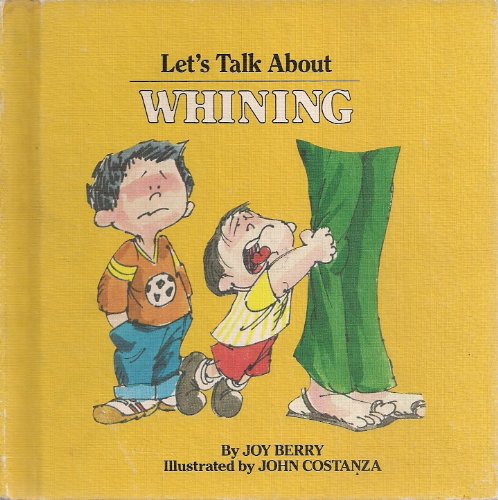Title: Let’s Talk About Whining
Author: Joy Wilt Berry
Author's web site: https://joyberrybooks.com/en/
Date: 1982, 1984
Publisher: Childrens Press
ISBN: none; click here to see it on Amazon
Length: 32 pages
Illustrations: color drawings by John Costanza
Quote: “If you do not want others to whine when they are with you, you must not whine when you are with them.”
If you find yourself telling a child the same thing over and over, there are two likely possibilities. One is that the child won’t be motivated to do what you’re trying to tell it to do until you come up with a better set of rewards and punishments, so your words are being wasted. The other is that the child doesn’t understand what you mean (or isn’t able to do what you’re telling it to do), so your words are being wasted.
At the risk of arousing envy, I’ll confess that there are no whiny children in my life. Whining has never been among any of The Nephews' shortcomings. The main source of whininess in my life is the Cat Sanctuary cats--well, some of them. Bisquit was the whiner in residence for a few years. She had only a little distant Siamese ancestry, but she did have partial albinism and she was a very smart, social, and vocal cat.
She didn’t whine too much for the first three months or so of her life. In her very social cat family, everyone seemed to have a particular friend, and Bisquit was closest to her brother Spot, a male calico kitten. Like many male calico cats, Spot was sickly and died young. And from that time forward, Bisquit whined. She whined a little less when she had kittens, but she didn’t completely stop whining, even then, until she finally reared a female kitten who was allowed to stay as a resident cat.
Bisquit did not, in any case, whine less because she’s been exposed to this book. Bisquit was in fact exposed to a box of children’s books the local library had discarded, which were stored in a shed to which the cats have access. And some of the books did interest her. I can’t account for Bisquit’s taste in literature (crickets may have been involved), but she really did paw through the pages of a first book about bats called The Haunted Birdhouse . So far as I can tell, she didn’t touch Let’s Talk About Whining. Bisquit never seemed interested in talking about whining. When talked to about her whining, as in “Bisquit, be quiet!”, she usually interrupted whatever was being said with a whine.
. So far as I can tell, she didn’t touch Let’s Talk About Whining. Bisquit never seemed interested in talking about whining. When talked to about her whining, as in “Bisquit, be quiet!”, she usually interrupted whatever was being said with a whine.
Why am I dithering off on a tangent about a cat? Because, Gentle Readers, I suspect that reading a book called Let’s Talk About Whining to a child is likely to do about as much good as reading it to a cat.
You can try to make it easier for the child to feel happier. You can listen to what the child is saying when it whines. If a child whines for a different expensive video game every week, obviously whining is only the tip of the iceberg, as far as the child’s problems are concerned. If a child consistently whines, “I hate school, I hate math, I hate my teacher,” or “I don’t want to get up, I don’t want to go out and play, I don’t want to go to Grandpa’s house and ride the pony,” or “I hate this house, I hate this neighborhood, I want to move back to home,” you could try actually doing something about these problems. ("I don't want to go out and play" probably indicates some sort of chronic low-grade illness.)
You might also try using a counter-irritant as a distraction. A child who whines a great deal about not having as much as some other child has, or about being resented by other children who don’t have as much as it has, might benefit from a chance to work on an inner-city or disaster-relief project. A child who whines for more pocket money might be improved by an after-school job.
You could even try reading Let’s Talk About Whining aloud as a punishment. Punishment for whining is unlikely to be as effective as addressing the root cause, but if adults read a psychological sermonette aloud a few hundred times, it’s just possible that a child will be motivated to change its behavior in a way that will get the adults to read something by Dr. Seuss instead.
A lot of adults have used and are using Joy Wilt Berry's books. Literally dozens for each age group are available, new, from the author's web site. Let's Talk About Whining seems to have been removed from the web site but is still widely available secondhand. So...if you buy it here, by sending $5 per book + $5 per package (up to $55 for any ten of Berry's older books shipped together), Berry or a charity of her choice will receive $1 per copy (yes, $10 for ten books).
Let's see if Blogjob will show you pictures of four Berry books here...It won't. Sorry. Viewing and ordering newer books from her web site would be a nicer way to encourage a writer, anyway. Here's a picture of this particular book.
(Wordpress tags: child psychology, children’s book, fix facts first let feelings follow, Joy Berry Books, Priscilla King’s cat Bisquit, whining.)

No comments:
Post a Comment